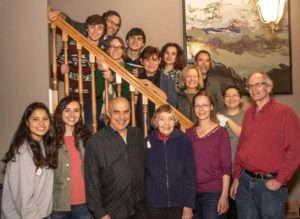Rule #1: Take Time to Say Hello to Strangers
Over the past couple of decades, I've become eager to say hello to people I don't know, but it wasn't always this way. I'm most definitely an introvert and it was easy to walk on by. Through trial and error, though, I've learned that you have no idea who that person is, the one you are passing on the street. It might be a person with a fantastic story. For instance, when my kids were young, I often walked past a man at my kids' grade school, merely saying hello. It was months later that I learned that he was a Grammy Award winning jazz piano player who toured the world.
About 20 years ago, at a Christmastime event at the home of a neighbor of my former family-in-law my father-in-law asked me, "Erich, have you met James Watson yet?" I hadn't. That night, while most of the neighbors sang Christmas carols, I had the opportunity to discuss the double helix with the co-discoverer of DNA.
father-in-law asked me, "Erich, have you met James Watson yet?" I hadn't. That night, while most of the neighbors sang Christmas carols, I had the opportunity to discuss the double helix with the co-discoverer of DNA.
There's all kinds of interesting people all around you. Most of them don't send you any clues to their accomplishments, not until you say hello and strike up a conversation. You will miss out on some of the best parts of life if you don't take the time to say hello to strangers.
Sixteen years ago, in April, 2004, I took the time to get to know a woman who walked her two dogs (Cara Mia and Bobinskion) up and down my street every day. The woman's name was Bisia and it turned out that she was a Polish Countess who had an unusual story, a heroic story based on her life in Poland during World War II. She was 85-years old when I sat down to interview her for the Flora Place neighborhood newsletter. At that time, Bisa was married to her 95 year old husband, Isham. They have both passed away since I interviewed with her. After I wrote up her story, I noticed that the local PBS station had produced a feature on her too. I've embedded that link below.
I wrote this 15 years ago and rediscovered it today. I'd like to once again share her story. I hope you enjoy this.
The Countess of Flora Place
Originally Published April, 2004
Each of us might not have ended up living on Flora Place. Life offers many paths to many other places. I, for instance, grew up in St. Louis County and learned of this beautiful street through friends. My personal path to becoming a Flora Place resident, then, was not surprising.
For others, though, the journey followed convoluted and precarious paths. One such person is Bisia Reavis, who has lived with her husband Isham at 4122 Flora Place since 1958. As one of the most prominent dog-walkers on the street, Bisia is virtually an institution. Always ready with her kind smile and encouraging words, she is generally accompanied on her walks by Cara Mia (a Doberman) and Bobinski (“Bo,” a Poodle).
The current editor of this newsletter has decided to begin a series of articles highlighting the stories some of our many interesting neighbors. Bisia was kind enough to share her journey from Poland to Flora Place as the first article in this series.
Formerly known as Countess Elizbieta Krasicka, Bisia was the youngest of six children born in 1921 to Count August from Siecin Krasicki and Countess Isabella from Granow Wodzicka. The family lived at the Castle at Lesko, in Poland (present day Ukraine) tucked along the Carpathian Mountains. The sprawling estate stretched to the borders of both Hungary and Czechoslovakia. The bright red family coat of arms is the symbol of a lineage of nobility stretching back to 1540. Bisia’s story involves many ancillary episodes. Her Grandfather Stanislaw traveled to Mexico to serve as one of Maximillian’s officers in the 1860’s. Her uncle, the Archbishop of Krakow, ordained Pope John-Paul II.
Bisia was 17 when war broke out in September, 1939. The Germans and Soviets quickly decided that the San River (which flowed through the family garden) would serve as their contentious line of demarcation.


